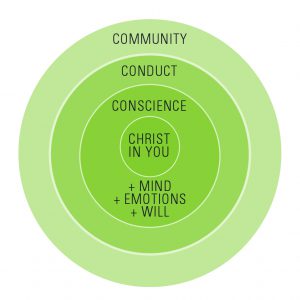 In a rapidly changing culture, more and more Christians are discussing the importance of cultural engagement. Yet what role does preaching play in cultural engagement and cultural formation? To help us answer these questions, we turned to Jim Shaddix.
In a rapidly changing culture, more and more Christians are discussing the importance of cultural engagement. Yet what role does preaching play in cultural engagement and cultural formation? To help us answer these questions, we turned to Jim Shaddix.
Dr. Shaddix is the W. A. Criswell Chair of Expository Preaching at Southeastern Seminary. In addition, he is an accomplished preacher and author. Here’s part one of our conversation:
What role does preaching play in cultural engagement and cultural formation?
“Cultures are shaped by communities, and communities are shaped by individuals. Consequently, engaging and forming cultures through preaching begins with engaging and forming individuals with God’s Word. Several years ago I developed some concentric circles to help me think through how preaching affects life change in an individual and ultimately in his or her community.[1] Consider this development:

“The idea goes something like this. Behavioral change takes place first when the spirit of a person is being transformed into the image of Christ. And I believe the primary agent the Holy Spirit uses to affect this life change is the truth of God’s Word. So when the Word is preached, and listeners embrace it, then transformation begins. That truth then affects a person’s conscience. This is sometimes referred to as the soul, or the mind, will and emotions. When an individual begins to think, feel and desire like Jesus, then transformation begins to affect conduct. And when the conduct of a group of people begins to reflect the person of Christ, then a community is transformed.
“We can easily add one more circle beyond these four — culture. When enough communities are true reflections of the body of Christ, then culture is going to be affected positively. So, we engage and shape cultures by first engaging and shaping individuals into the image of Christ. The issue is not about simply speaking to warped cultural values (e.g., gay marriage, sexual identity, abortion rights, etc.). Certainly we need to speak prophetically to those and all cultural norms that God addresses in his Word. But cultural change primarily is going to come about as individuals and communities are moved to embrace and reflect the values of Christ. Preaching needs to be directed first and foremost to that end.”
Practically, what does this look like?
“V. L. Stanfield once said that preaching can be defined as giving the Bible voice. When we preach, we speak for God. And, therefore, we speak only what God says in His Word. God has ordained the truth that is necessary to bring about transformation, and He’s written it down in His Word, the Bible. Shortly before His death Jesus asked the Father to ‘sanctify them in the truth; your Word is truth’ (John 17:17). He understood that God’s ordained truth was the secret to people being shaped into His image. Preachers must understand the same thing. The only hope we have of seeing transformation in the lives of people is to expose them to the truth of God’s Word.
“That’s why I’m committed to expository preaching and believe it’s the most practical way to engage and shape individuals — and ultimately cultures — into the image of Jesus Christ. Expository preaching is simply laying open every Bible text in such a way that the Holy Spirit’s intended meaning and accompanying power are brought to bear on the lives of contemporary listeners. When the truth of the Bible is interpreted with integrity and preached accordingly, then God’s supernatural power is applied to the lives of those who hear it. And when people receive His truth and gladly align their lives with it, Christ begins to be formed in them. And as they are re-created into Christ image, the communities and cultures they inhabit began to be influenced.
Preaching is not the only thing pastors do, but it better be the first thing they do.
“Preaching is not the only thing pastors do, but it better be the first thing they do. We have no greater medium through which to bring about life transformation than the faithful exposition of God’s Word. Consequently, every preacher must give himself to the disciplines of Ezra, who ‘set his heart to study the Law of the Lord, and to do it and to teach his statutes and rules in Israel’ (Ezra 7:10). Practically speaking, we engage and shape culture by studying God’s Word intently, obeying what he says entirely, and teaching others to do the same through the regular exposition of the Bible. And all of this must be done against the backdrop of utter desperation for and dependence upon God’s Holy Spirit to attend to this work.”
Check out part two of our conversation with Dr. Shaddix. He shares the dangers of preaching and cultural engagement, and he highlights key preachers who do cultural engagement well.
[1] Jim Shaddix, The Passion Driven Sermon: Changing the Way Pastors Preach and Congregations Listen (Nashville, TN: Broadman & Holman, 2003), 112.





Comments and Pingbacks
2017-03-20 06:31:29
Jim Shaddix: Avoid These Pitfalls When Preaching for Cultural Engagement | Intersect
[…] part one of our interview, Dr. Shaddix explained why and how preachers can engage culture. Here’s part two of our […]